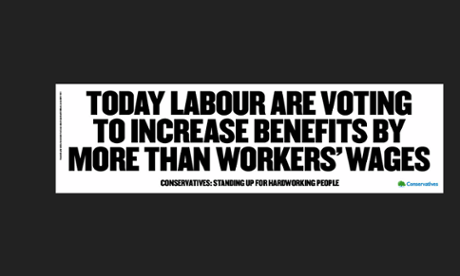According to Janan Ganesh's recent biography, The Austerity Chancellor, George Osborne believes that it is important for politicians to be able to "weaponise" policy. The chancellor doesn't just mean coming up with ideas that are popular. He means sharpening them, finessing them, and spinning them until they become electorally potent, capable of swaying voters and disabling opponents who find them impossible to argue against convincingly. Ganesh cites the Tories' pre-2010 "jobs tax" slogan as an example, but the welfare benefits uprating bill, which gets its second reading in the Commons this afternoon, is the best example in recent history of policy being weaponised.
The bill imposes a 1% cap on benefit increases (ie, an effective cut) until 2016 and it is a testament to Osborne's ingenuity because it is a piece of legislation that is both apparently popular and opposed by the Labour party. At the Conservative conference last year Osborne started making a distinction between "strivers" and "shirkers", the people who supposedly stay at home with the curtains drawn while everyone else goes out to work, and the bill is designed to place Labour on the side of the "shirkers". In the Observer at the weekend, Andrew Rawnsley said it should be properly described as the Welfare (Make Labour Look Like the Party for Skiving Fat Slobs) bill. Before Christmas the Conservatives launched an advertising campaign that actually depicted a slob (but not a particularly fat one) on the sofa. More recently the Conservatives have toned down their "skivers" language, but they are still on the offensive and today they have launched a new poster attacking Labour for opposing the bill.

There are more details here.
But is this bill really going to work as well for the Conservatives as Osborne hopes? Although the public appear to approve, the polls give quite different answers, depending on how the questions are asked, and the TUC has published some important research showing that opposition to welfare spending is based on ignorance about where the money actually goes. Some 60% of the people who will lose out as a result of this bill are in work and it is conceivable that this could backfire. In a Telegraph blog today, the Tory commentator Benedict Brogan says that the public could side with Labour.
When times are tough there is little collective appetite for generosity beyond what is affordable and fair. But tone is all. The challenge for the Tories is to portray themselves as doing what is difficult but necessary in the national interest, without appearing to relish either the measure or the game too much. It may not be surprising that Sarah Teather will vote against the Government, but her point about 'playground politics' will find some sympathisers. Sarah Wollaston, the Tory GP, for example, said last night: "Not just libdems unhappy at terms like 'skivers'. Difficult decisions should not use divisive rhetoric". Politics sometimes requires going for the kill, but Mr Cameron cannot be certain whether voters will be happy to see Labour's noses being rubbed in it today.
You can read the full blog here.
The bill will easily get a second reading today and there is unlikely to be a large government rebellion. But I will be covering it in detail because this is such an important debate. Welfare spending will be a key issue - possibly the key issue - dividing the parties in the runup to the general election.
Here's the full diary for the day.
11.30am: Nick Clegg takes deputy prime minister's questions in the Commons.
12.30pm: MPs start debating the welfare benefits uprating bill. Iain Duncan Smith, the work and pensions secretary, is opening the debate, and Liam Byrne, his Labour shadow, is responding. I will cover the debate in detail until it ends at 7pm.
2.40pm: Sir Hugh Orde, the president of the Association of Chief Police Officers, gives evidence to the Commons home affairs committee about policing. At 4pm Sir Bernard Hogan-Howe, the commissioner of the Metropolitan police, gives evidence.
As usual, I'll also be covering all the breaking political news as well as looking at the papers and bringing you the best politics from the web. I'll post a lunchtime summary before the debate starts at 12.30pm, and another when it's over.
If you want to follow me on Twitter, I'm at @AndrewSparrow.

No hay comentarios:
Publicar un comentario